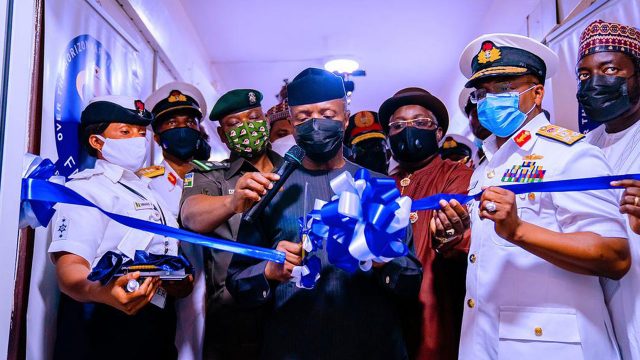Nigeria commissions ‘Falcon Eye system’ to curb maritime insecurity
The Nigerian government has made a move towards ending maritime insecurity including terrorism and piracy in the country’s maritime space as it launches the ‘Falcon Eye system’.
The falcon eye is a maritime security technology that has the capacity to spot, chase and interdict maritime criminals quietly and efficiently on the nation’s sea lanes.
The falcon eye system is a state-of-the-art surveillance facility that incorporates various sensors located along Nigeria’s coastline.
This includes the radars, long-range electro-optic systems with thermal or night vision capability, automatic identification system receivers, weather stations and marine very high-frequency radios for communication.
The coming on board of the facility, according to the Vice President, Yemi Osinbajo who spoke on behalf of president Muhamamadu Buhari, is expected to also curb the loss of $26.3 billion yearly in revenue due to activities of maritime criminality.
The vice president on Tuesday, July 13, commissioned the facility for the naval force, tasked with securing Nigeria’s maritime environment from external aggression.
Speaking at the commissioning, the vice president said, “the integration of these sensors into the falcon eye system generates a real-time situational awareness of the activities within our maritime environment for further analysis.”
He noted that the maritime industry, which encompasses fishing and resource exploration, marine research and shipping, occupies a prominent position in the matrix of the country’s economic interests.
Mr Osinbajo said, “of all these activities, shipping stands out as a critical link in Nigeria’s international trade engagements because it is the cheapest and the most efficient means of moving large volumes of goods.”
Adding to this, the National Security Adviser, Major-General Babagana Monguno (retired), said the project was borne out of the necessity to combat the myriad of security challenges within the maritime sector.
He said the challenges range from cases of kidnapping of oil workers, sea robbery/piracy, incessant problems of crude oil theft, and illegal bunkering.
He added that hostage-taking, maritime terrorism amongst a host of other criminal activities perpetrated within the maritime domain are challenges that the facility would help deal with.
“Most importantly, this facility provides a total radar coverage of Nigeria’s maritime environment, which would greatly assist the Nigerian Navy to achieve its operational objectives,” the national security adviser said.
He further said that the contract for the project, signed in 2014 has been “designed to provide Nigeria with an effective surveillance capability of her entire maritime domain.”
The Chief of Naval Staff, Vice Admiral Awwal Zubairu Gambo, observed that, “the Falcon Eye System incorporates surveillance and intelligence capabilities that enable decision-making on shipping activities, maritime safety and violation of maritime laws.”
“The system combines various sensors such as Coastal Radars, Over the Horizon Radars, Cameras to generate a comprehensive picture of the Nigerian maritime environment,” Vice Admiral Gambo stated.
READ ALSO: Govt Determined To Address Maritime Piracy, Kidnappings
Ghana is resolved to tackle maritime insecurity
A similar move to curb maritime insecurity has been made in Nigeria’s neighbouring country, Ghana, where the government is acquiring Offshore Patrol Vessels (OPVs), Fast Patrol Boats and Crafts.
In addition, the country is making funds available for the timely completion of a military Forward Operating Base at Ezinlibo in the Western Region.
This was disclosed by the vice president, Dr Mahamudu Bawumia when he addressed stakeholders at the International Maritime Defense Exhibition and Conference (IMDEC ’21) in Accra, which ended on July 8, 2021.
In his address, the vice president noted that the criminals in the maritime industry have increased their operational range, leading to a high-security threat.
This situation, Dr Bawumia said, is a subject of the government’s interest, and would institute the necessary measures, together with various stakeholders, locally and on the international front to deal with it pragmatically.



